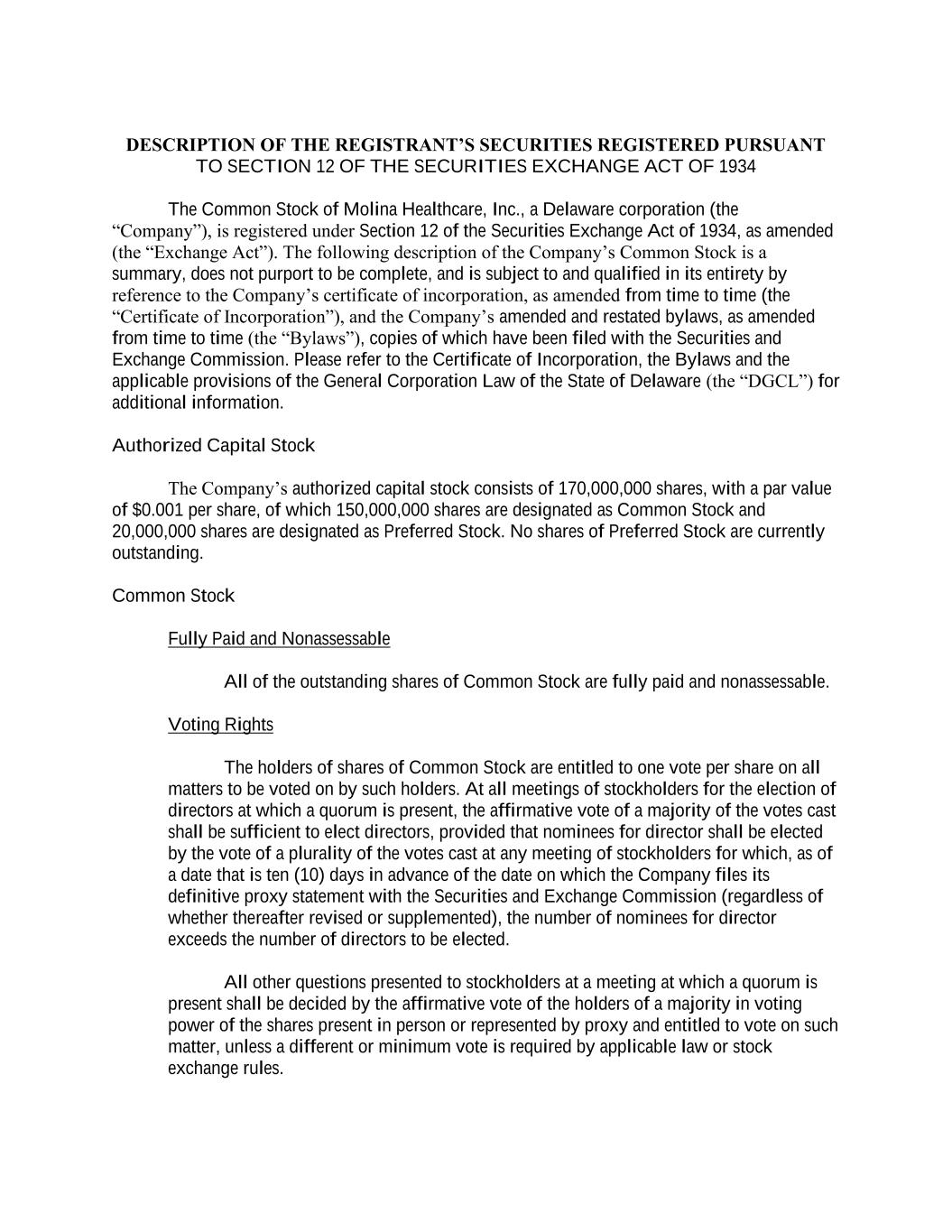
DESCRIPTION OF THE REGISTRANT’S SECURITIES REGISTERED PURSUANT TO SECTION 12 OF THE SECURITIES EXCHANGE ACT OF 1934 The Common Stock of Molina Healthcare, Inc., a Delaware corporation (the “Company”), is registered under Section 12 of the Securities Exchange Act of 1934, as amended (the “Exchange Act”). The following description of the Company’s Common Stock is a summary, does not purport to be complete, and is subject to and qualified in its entirety by reference to the Company’s certificate of incorporation, as amended from time to time (the “Certificate of Incorporation”), and the Company’s amended and restated bylaws, as amended from time to time (the “Bylaws”), copies of which have been filed with the Securities and Exchange Commission. Please refer to the Certificate of Incorporation, the Bylaws and the applicable provisions of the General Corporation Law of the State of Delaware (the “DGCL”) for additional information. Authorized Capital Stock The Company’s authorized capital stock consists of 170,000,000 shares, with a par value of $0.001 per share, of which 150,000,000 shares are designated as Common Stock and 20,000,000 shares are designated as Preferred Stock. No shares of Preferred Stock are currently outstanding. Common Stock Fully Paid and Nonassessable All of the outstanding shares of Common Stock are fully paid and nonassessable. Voting Rights The holders of shares of Common Stock are entitled to one vote per share on all matters to be voted on by such holders. At all meetings of stockholders for the election of directors at which a quorum is present, the affirmative vote of a majority of the votes cast shall be sufficient to elect directors, provided that nominees for director shall be elected by the vote of a plurality of the votes cast at any meeting of stockholders for which, as of a date that is ten (10) days in advance of the date on which the Company files its definitive proxy statement with the Securities and Exchange Commission (regardless of whether thereafter revised or supplemented), the number of nominees for director exceeds the number of directors to be elected. All other questions presented to stockholders at a meeting at which a quorum is present shall be decided by the affirmative vote of the holders of a majority in voting power of the shares present in person or represented by proxy and entitled to vote on such matter, unless a different or minimum vote is required by applicable law or stock exchange rules.
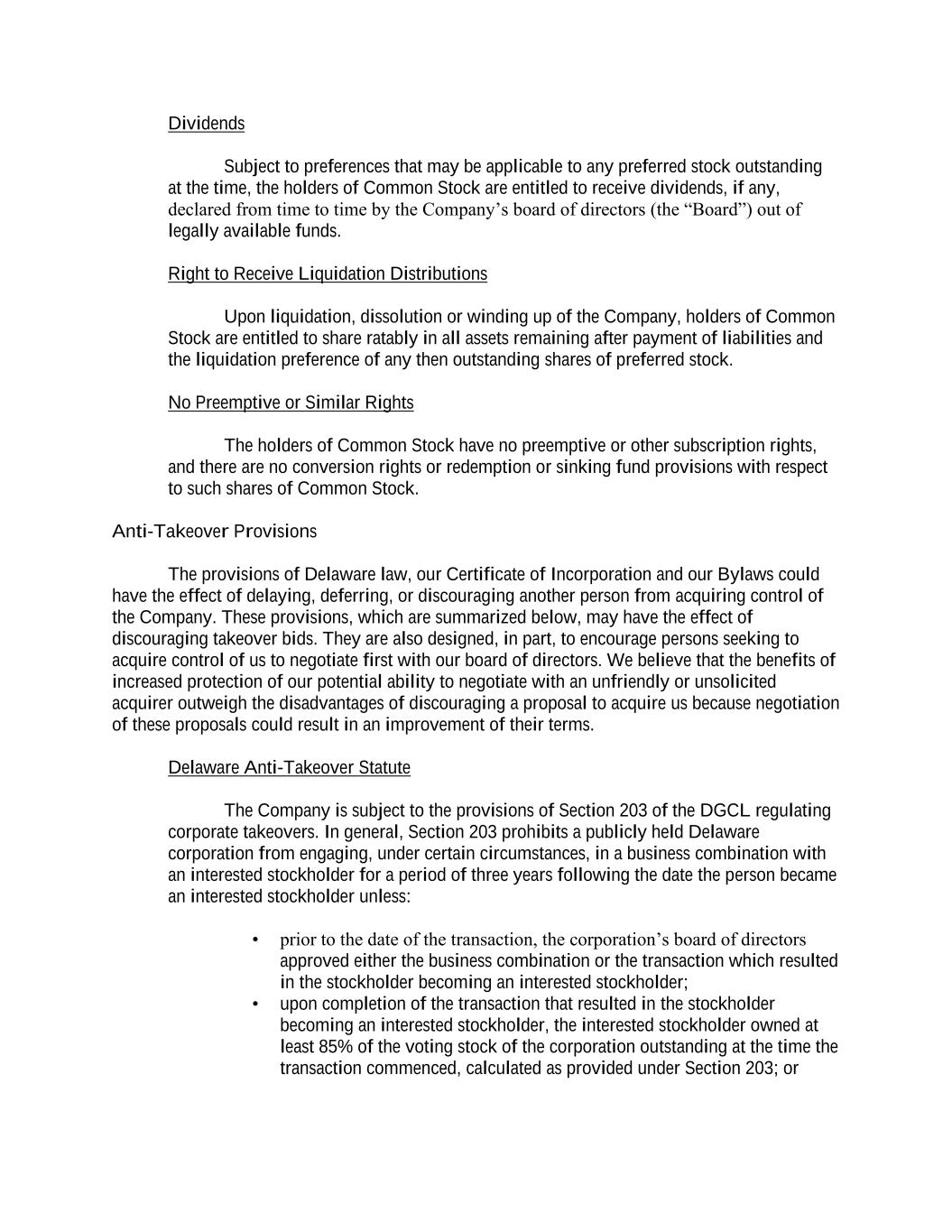
Dividends Subject to preferences that may be applicable to any preferred stock outstanding at the time, the holders of Common Stock are entitled to receive dividends, if any, declared from time to time by the Company’s board of directors (the “Board”) out of legally available funds. Right to Receive Liquidation Distributions Upon liquidation, dissolution or winding up of the Company, holders of Common Stock are entitled to share ratably in all assets remaining after payment of liabilities and the liquidation preference of any then outstanding shares of preferred stock. No Preemptive or Similar Rights The holders of Common Stock have no preemptive or other subscription rights, and there are no conversion rights or redemption or sinking fund provisions with respect to such shares of Common Stock. Anti-Takeover Provisions The provisions of Delaware law, our Certificate of Incorporation and our Bylaws could have the effect of delaying, deferring, or discouraging another person from acquiring control of the Company. These provisions, which are summarized below, may have the effect of discouraging takeover bids. They are also designed, in part, to encourage persons seeking to acquire control of us to negotiate first with our board of directors. We believe that the benefits of increased protection of our potential ability to negotiate with an unfriendly or unsolicited acquirer outweigh the disadvantages of discouraging a proposal to acquire us because negotiation of these proposals could result in an improvement of their terms. Delaware Anti-Takeover Statute The Company is subject to the provisions of Section 203 of the DGCL regulating corporate takeovers. In general, Section 203 prohibits a publicly held Delaware corporation from engaging, under certain circumstances, in a business combination with an interested stockholder for a period of three years following the date the person became an interested stockholder unless: • prior to the date of the transaction, the corporation’s board of directors approved either the business combination or the transaction which resulted in the stockholder becoming an interested stockholder; • upon completion of the transaction that resulted in the stockholder becoming an interested stockholder, the interested stockholder owned at least 85% of the voting stock of the corporation outstanding at the time the transaction commenced, calculated as provided under Section 203; or
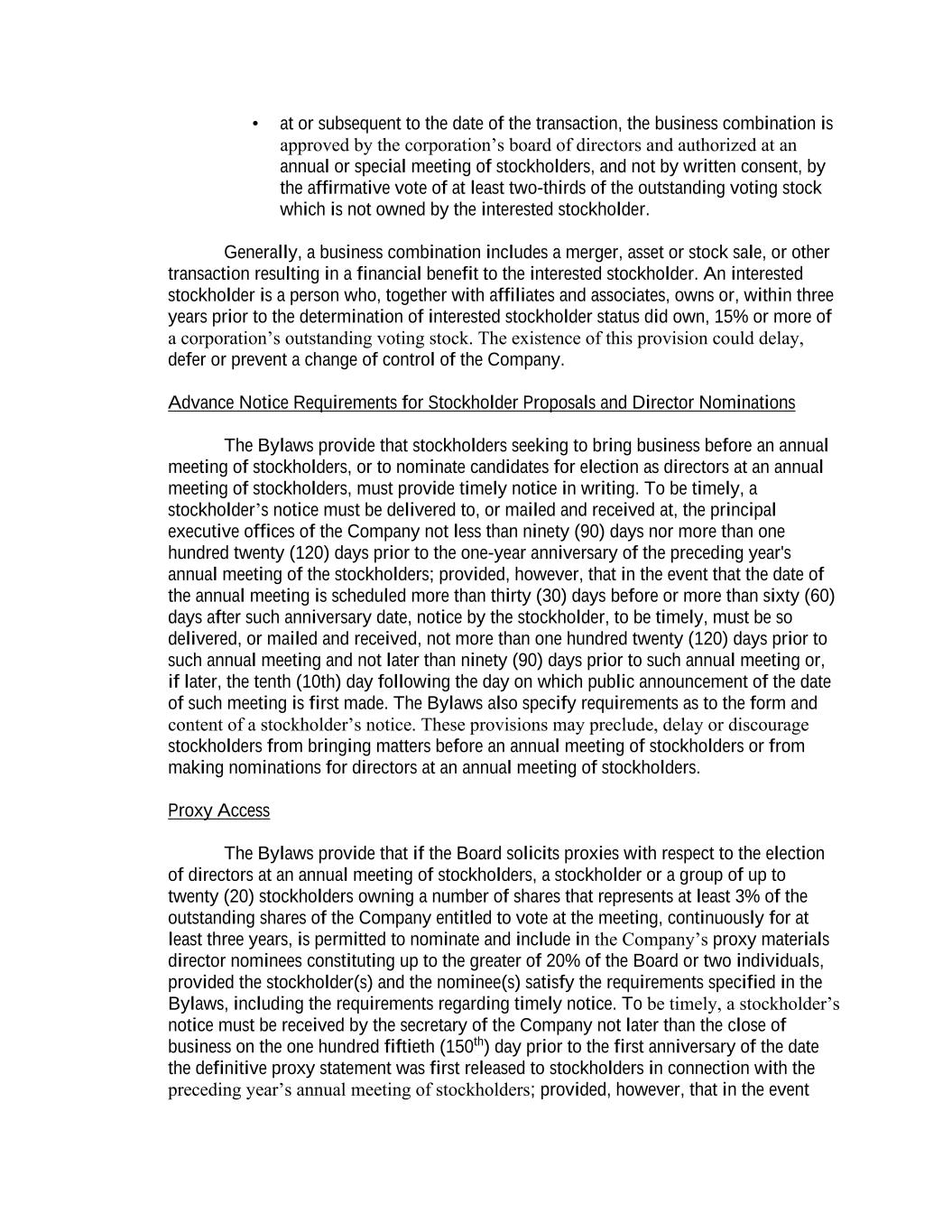
• at or subsequent to the date of the transaction, the business combination is approved by the corporation’s board of directors and authorized at an annual or special meeting of stockholders, and not by written consent, by the affirmative vote of at least two-thirds of the outstanding voting stock which is not owned by the interested stockholder. Generally, a business combination includes a merger, asset or stock sale, or other transaction resulting in a financial benefit to the interested stockholder. An interested stockholder is a person who, together with affiliates and associates, owns or, within three years prior to the determination of interested stockholder status did own, 15% or more of a corporation’s outstanding voting stock. The existence of this provision could delay, defer or prevent a change of control of the Company. Advance Notice Requirements for Stockholder Proposals and Director Nominations The Bylaws provide that stockholders seeking to bring business before an annual meeting of stockholders, or to nominate candidates for election as directors at an annual meeting of stockholders, must provide timely notice in writing. To be timely, a stockholder’s notice must be delivered to, or mailed and received at, the principal executive offices of the Company not less than ninety (90) days nor more than one hundred twenty (120) days prior to the one-year anniversary of the preceding year's annual meeting of the stockholders; provided, however, that in the event that the date of the annual meeting is scheduled more than thirty (30) days before or more than sixty (60) days after such anniversary date, notice by the stockholder, to be timely, must be so delivered, or mailed and received, not more than one hundred twenty (120) days prior to such annual meeting and not later than ninety (90) days prior to such annual meeting or, if later, the tenth (10th) day following the day on which public announcement of the date of such meeting is first made. The Bylaws also specify requirements as to the form and content of a stockholder’s notice. These provisions may preclude, delay or discourage stockholders from bringing matters before an annual meeting of stockholders or from making nominations for directors at an annual meeting of stockholders. Proxy Access The Bylaws provide that if the Board solicits proxies with respect to the election of directors at an annual meeting of stockholders, a stockholder or a group of up to twenty (20) stockholders owning a number of shares that represents at least 3% of the outstanding shares of the Company entitled to vote at the meeting, continuously for at least three years, is permitted to nominate and include in the Company’s proxy materials director nominees constituting up to the greater of 20% of the Board or two individuals, provided the stockholder(s) and the nominee(s) satisfy the requirements specified in the Bylaws, including the requirements regarding timely notice. To be timely, a stockholder’s notice must be received by the secretary of the Company not later than the close of business on the one hundred fiftieth (150th) day prior to the first anniversary of the date the definitive proxy statement was first released to stockholders in connection with the preceding year’s annual meeting of stockholders; provided, however, that in the event
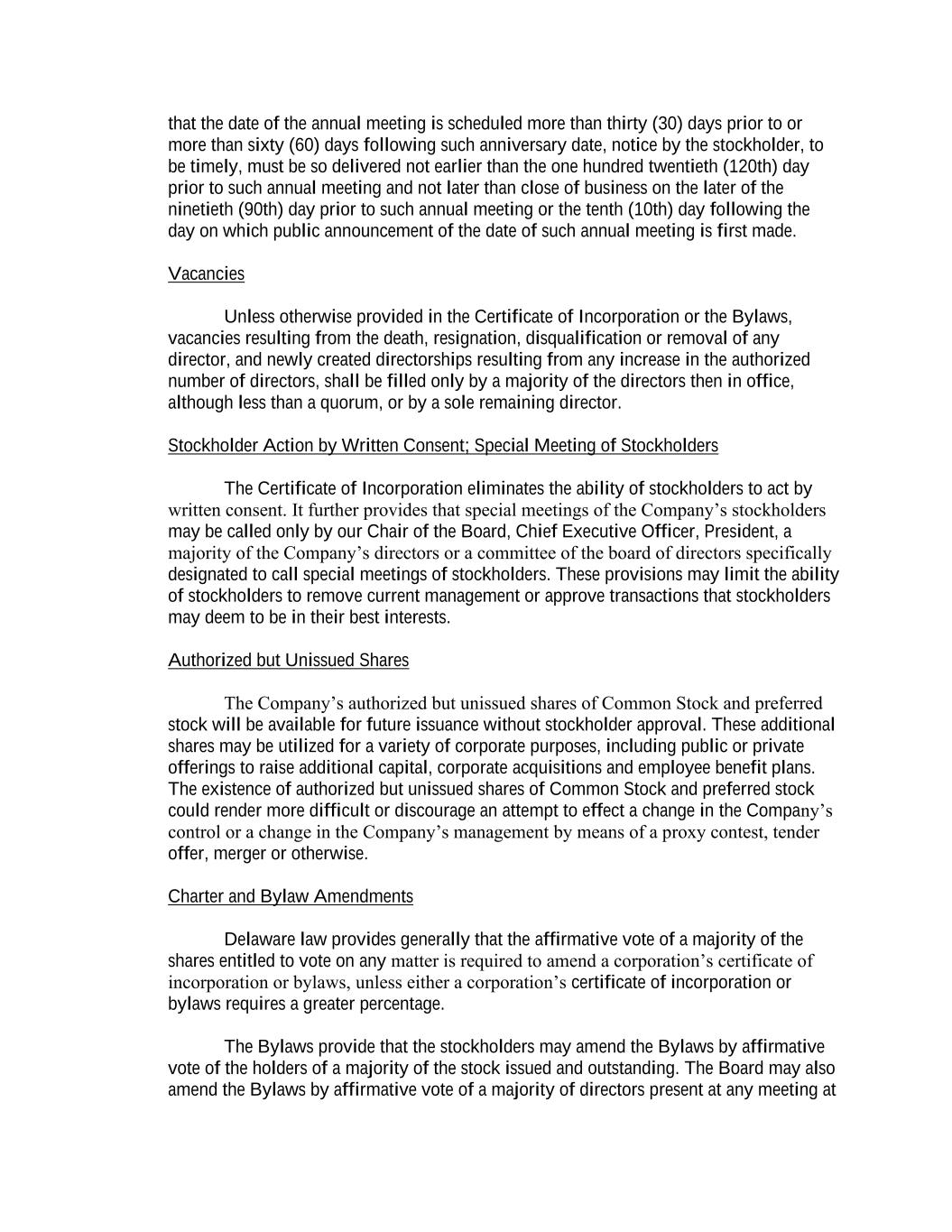
that the date of the annual meeting is scheduled more than thirty (30) days prior to or more than sixty (60) days following such anniversary date, notice by the stockholder, to be timely, must be so delivered not earlier than the one hundred twentieth (120th) day prior to such annual meeting and not later than close of business on the later of the ninetieth (90th) day prior to such annual meeting or the tenth (10th) day following the day on which public announcement of the date of such annual meeting is first made. Vacancies Unless otherwise provided in the Certificate of Incorporation or the Bylaws, vacancies resulting from the death, resignation, disqualification or removal of any director, and newly created directorships resulting from any increase in the authorized number of directors, shall be filled only by a majority of the directors then in office, although less than a quorum, or by a sole remaining director. Stockholder Action by Written Consent; Special Meeting of Stockholders The Certificate of Incorporation eliminates the ability of stockholders to act by written consent. It further provides that special meetings of the Company’s stockholders may be called only by our Chair of the Board, Chief Executive Officer, President, a majority of the Company’s directors or a committee of the board of directors specifically designated to call special meetings of stockholders. These provisions may limit the ability of stockholders to remove current management or approve transactions that stockholders may deem to be in their best interests. Authorized but Unissued Shares The Company’s authorized but unissued shares of Common Stock and preferred stock will be available for future issuance without stockholder approval. These additional shares may be utilized for a variety of corporate purposes, including public or private offerings to raise additional capital, corporate acquisitions and employee benefit plans. The existence of authorized but unissued shares of Common Stock and preferred stock could render more difficult or discourage an attempt to effect a change in the Company’s control or a change in the Company’s management by means of a proxy contest, tender offer, merger or otherwise. Charter and Bylaw Amendments Delaware law provides generally that the affirmative vote of a majority of the shares entitled to vote on any matter is required to amend a corporation’s certificate of incorporation or bylaws, unless either a corporation’s certificate of incorporation or bylaws requires a greater percentage. The Bylaws provide that the stockholders may amend the Bylaws by affirmative vote of the holders of a majority of the stock issued and outstanding. The Board may also amend the Bylaws by affirmative vote of a majority of directors present at any meeting at
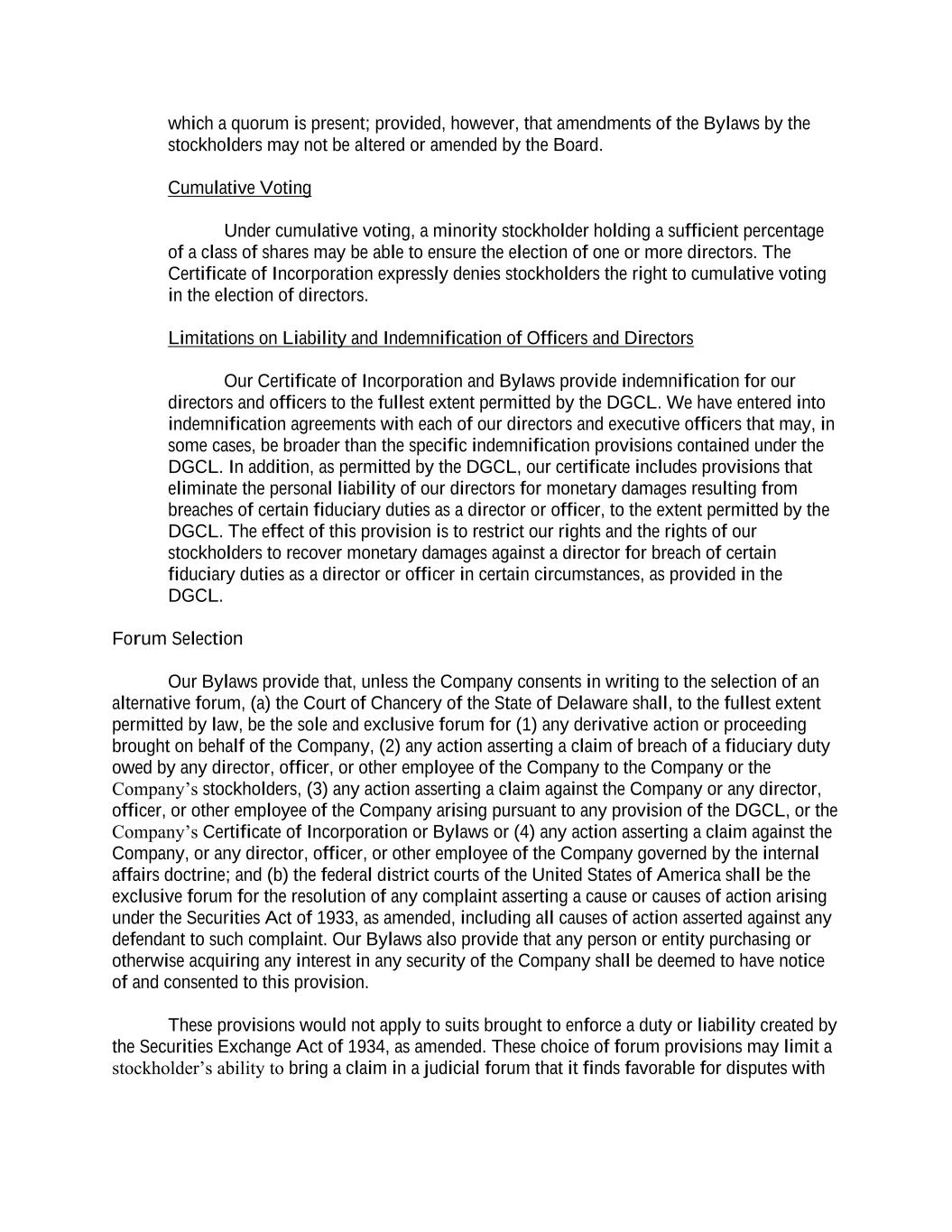
which a quorum is present; provided, however, that amendments of the Bylaws by the stockholders may not be altered or amended by the Board. Cumulative Voting Under cumulative voting, a minority stockholder holding a sufficient percentage of a class of shares may be able to ensure the election of one or more directors. The Certificate of Incorporation expressly denies stockholders the right to cumulative voting in the election of directors. Limitations on Liability and Indemnification of Officers and Directors Our Certificate of Incorporation and Bylaws provide indemnification for our directors and officers to the fullest extent permitted by the DGCL. We have entered into indemnification agreements with each of our directors and executive officers that may, in some cases, be broader than the specific indemnification provisions contained under the DGCL. In addition, as permitted by the DGCL, our certificate includes provisions that eliminate the personal liability of our directors for monetary damages resulting from breaches of certain fiduciary duties as a director or officer, to the extent permitted by the DGCL. The effect of this provision is to restrict our rights and the rights of our stockholders to recover monetary damages against a director for breach of certain fiduciary duties as a director or officer in certain circumstances, as provided in the DGCL. Forum Selection Our Bylaws provide that, unless the Company consents in writing to the selection of an alternative forum, (a) the Court of Chancery of the State of Delaware shall, to the fullest extent permitted by law, be the sole and exclusive forum for (1) any derivative action or proceeding brought on behalf of the Company, (2) any action asserting a claim of breach of a fiduciary duty owed by any director, officer, or other employee of the Company to the Company or the Company’s stockholders, (3) any action asserting a claim against the Company or any director, officer, or other employee of the Company arising pursuant to any provision of the DGCL, or the Company’s Certificate of Incorporation or Bylaws or (4) any action asserting a claim against the Company, or any director, officer, or other employee of the Company governed by the internal affairs doctrine; and (b) the federal district courts of the United States of America shall be the exclusive forum for the resolution of any complaint asserting a cause or causes of action arising under the Securities Act of 1933, as amended, including all causes of action asserted against any defendant to such complaint. Our Bylaws also provide that any person or entity purchasing or otherwise acquiring any interest in any security of the Company shall be deemed to have notice of and consented to this provision. These provisions would not apply to suits brought to enforce a duty or liability created by the Securities Exchange Act of 1934, as amended. These choice of forum provisions may limit a stockholder’s ability to bring a claim in a judicial forum that it finds favorable for disputes with
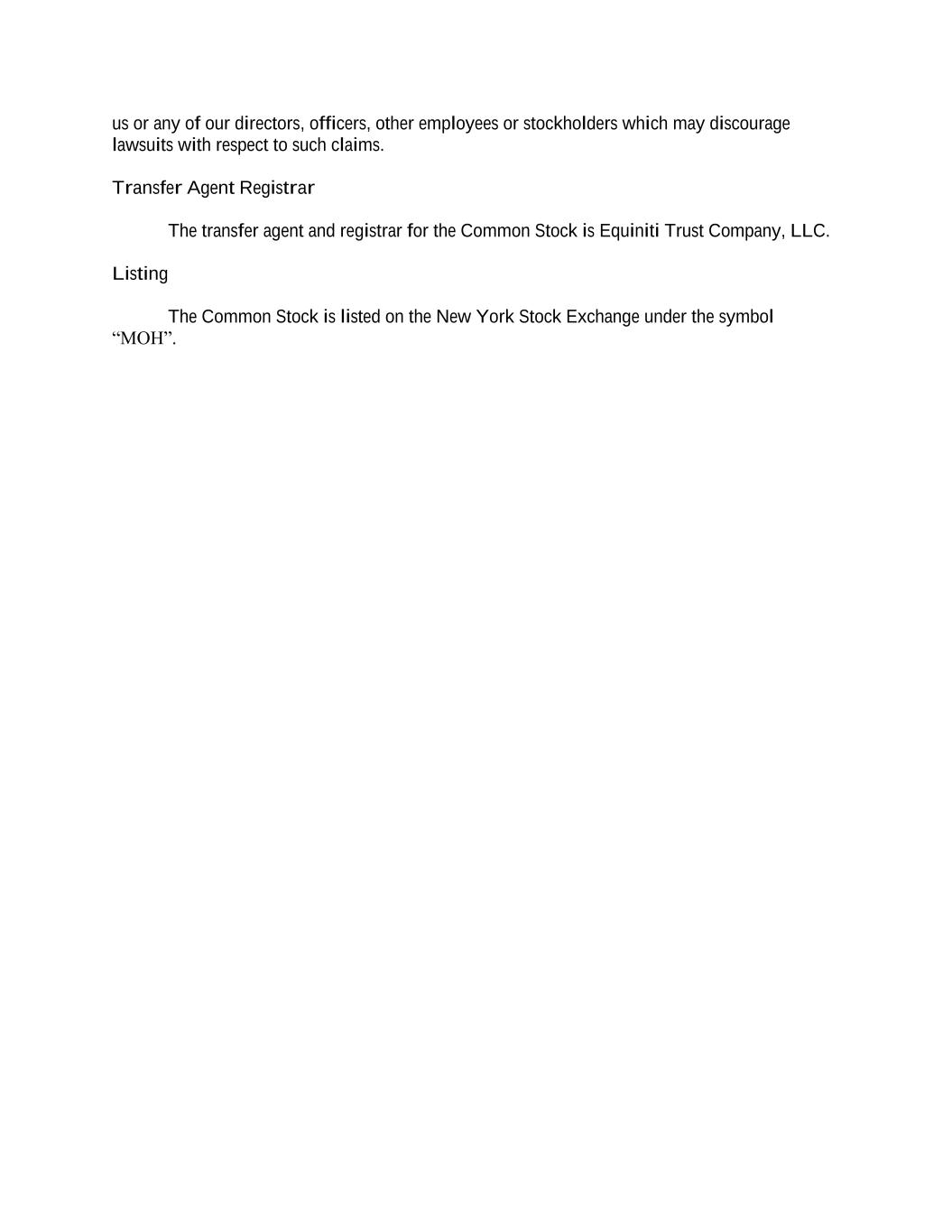
us or any of our directors, officers, other employees or stockholders which may discourage lawsuits with respect to such claims. Transfer Agent Registrar The transfer agent and registrar for the Common Stock is Equiniti Trust Company, LLC. Listing The Common Stock is listed on the New York Stock Exchange under the symbol “MOH”.





